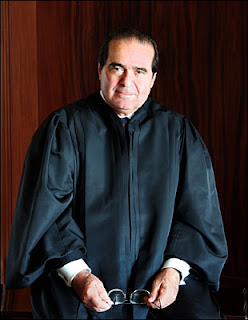If you’re going to be a good and faithful judge, you have to resign yourself to the fact that you’re not always going to like the conclusions you reach. If you like them all the time, you’re probably doing something wrong.
~ Associate Justice Antonin Scalia
1936-2016
Just six weeks into the year 2016, and two deaths have caused me to stop and take notice. The first, Glenn Frey, one of the founding members of the Eagles (arguably the greatest band of all time), died on January 18th. The Eagles, a product of the 1970s, provided one of the most frequently quoted lines of a popular song, "You can check out any time you like, but you can never leave." Many hours have been spent trying to interpret the lyrics to that song. Was it meant to be taken literally or was it a commentary on the culture of excess prevalent in Hollywood in the 1970s?
The second death that was more than a passing news story was the death of Supreme Court Justice Antonin Scalia that occurred just in the past couple days. Justice Scalia also used words to generate thought, but, unlike Glenn Frey, his job was to provide the interpretation of what someone else wrote. Specifically, his job was to interpret the intent of the Constitution.
Justice Scalia's judicial philosophy was one of "originalism." He believed that the Constitution should be interpreted in terms of what the founding fathers intended when they ratified the document over 200 years ago. In 2013, he told an audience at Southern Methodist University that the Constitution is "not a living document" and is "dead, dead, dead." His belief of a dead Constitution clashed with the views of his more liberal counterparts and the more commonly held view that the Constitution is a "living document," allowing courts to take into account the views of contemporary society. He hated the concept of "judicial activism," and believed that the legislature was responsible for bringing about change.
Within hours of the announcement of his death, talk of his replacement had already reached a fevered pitch. Senate Majority Leader Mitch McConnell (R-Ky) declared that President Obama should forgo selecting a replacement and leave that to the next President who will be elected in November and inaugurated in January 2017. At the Republican debate in Greenville, S.C., candidates echoed the idea that the next President should select Scalia's replacement.
It doesn't take a Harvard Law degree to realize that they would they be singing a different tune if the current President were a Republican. Perhaps not as obvious, however, is that holding off on appointing a successor is contrary to Justice Scalia's firmly held beliefs.
Article II, Section 2, Clause 2 of the Constitution states:
[The President] shall nominate, and, by and with the Advice and Consent of the Senate, shall appoint Ambassadors, other public Ministers and Consuls, Judges of the supreme Court, and all other Officers of the United States, whose Appointments are not herein otherwise provided for, and which shall be established by Law: but the Congress may by Law vest the Appointment of such inferior Officers, as they think proper, in the President alone, in the Courts of Law, or in the Heads of Departments.
[The President] shall nominate, and, by and with the Advice and Consent of the Senate, shall appoint Ambassadors, other public Ministers and Consuls, Judges of the supreme Court, and all other Officers of the United States, whose Appointments are not herein otherwise provided for, and which shall be established by Law: but the Congress may by Law vest the Appointment of such inferior Officers, as they think proper, in the President alone, in the Courts of Law, or in the Heads of Departments.
Justice Scalia probably would have put off retirement until at least after the next election when he would have known the political proclivities of the new President. He would have preferred that his successor lean more towards strict interpretation of the Constitution, rather than adapting it to fit with contemporary society. Still, he would not now read the clause above to include a "waiting period." On the other hand, Justice Scalia was in the minority on many recent Supreme Court decisions interpreting the Constitution, so maybe his beliefs should not enter into the discussion of his successor.
So, let's look at a source a little closer to home. On the website Congress.gov, there is the annotated Constitution. In other words, the Constitution is explained by citing various sources -- court opinions, Attorney General opinions, etc. There, you can find the following:
The bottom line: Congress cannot put conditions on Presidential appointments. Their job is to approve or reject the nominee put forth by the President.
One other point--Republicans seem to presuppose that the next President will be a Republican. However, with the possibility that one of the Democratic candidates may be elected, this may be a situation where they should be careful of what they wish for.


No comments:
Post a Comment